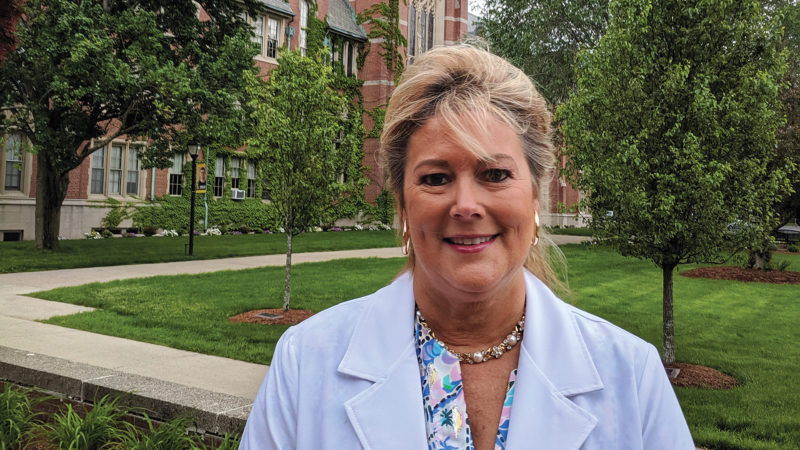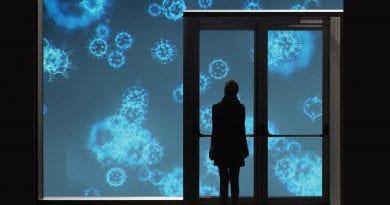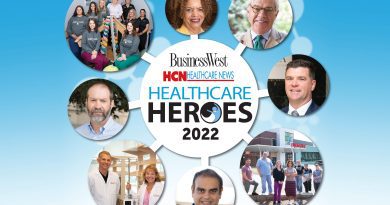Nursing Graduates Take Many Paths to Achieve Their Dreams
Passion and Persistence
This spring, area colleges and universities sent the latest batch of nursing-program graduates into the world, some to pursue higher degrees, some to begin working right away — and often both. But not every story follows a traditional path. For this issue’s focus on nursing education, HCN talked with three members of the class of 2019 about the opportunities available in nursing and the importance of following their passion — no matter how winding a road that turns out to be.
A Dream Deferred — Until Now
Diane Albano has come full circle in life, in a number of ways.
Take her connection with the Sisters of Providence. Adopted at 3 months old from Brightside for Families and Children 55 years ago, she will soon be starting her first nursing job at Mercy Medical Center.
That’s right, her first nursing job. But let’s start at the beginning.
“Growing up, I always wanted to be a nurse,” she said. “Growing up, my mother suffered from a rare blood disorder and had wounds all over her body. And I was frustrated because I couldn’t fix it, couldn’t fix the suffering that my mom was going through. It was very frustrating.”
After high school, she recalled, “my parents wanted to send me to Elms College, but even back then, it was very expensive.” Instead, she found her way into the field of respiratory therapy, and later embarked on a career as a dental hygienist.

A series of personal challenges arose, though, that altered her path. First was a serious car accident in 2001 that left her with partial paralysis that eventually went away with therapy, but also left her unable to continue her dental career. Her husband of just three months couldn’t handle the situation, she said, and divorced her.
“That was a traumatic experience — in sickness and in health, right?” she said.
A few years later, her mother died following a car accident; Albano returned home from Connecticut to the Berkshires to care for her in her final days, during which time her mother encouraged her to follow her heart and pursue that nursing career.
But, again, it wasn’t to be — yet. Her father got sick with metastatic bone cancer not long after, and she made a decision. “My goal was always to be there for my mom and dad, so I took my life savings from being a dental hygienist and decided to stay at home with my dad, in the home I was raised in, and take care of him.”
Before he died in 2010, Albano applied for the physician assistant program at Springfield College, but withdrew when he took a turn for the worse. “Right after my dad passed, I said, ‘what’s the plan?’ Here I was with nothing, no work, on disability since 2003. For a couple years, I tried to regroup, but I was in a tough place; after the loss of my parents, I felt all alone.”
But she did regroup, enrolling at Springfield Technical Community College in 2015 and deciding that nursing was, at long last, the way to go. She also spoke with an admissions official at Elms College and learned about its accelerated second degree in nursing track.
“I had an amazing interview with her and told her my life story; she looked at my résumé and said, ‘this is very impressive.’” But she needed to finish her associate’s degree first, which she did, also making the dean’s list at STCC.
“At 52, it’s harder trying to retain information — you don’t absorb things like you do in your 20s — and my stamina level isn’t as high,” she said. “And the pain in my body from the motor-vehicle accident will always be there; it’s a part of my life, but it’s controlled, and I’m grateful for that.”
Associate’s degree in hand, she officially applied for the accelerated program at Elms, which was not only competitive (taking only 24 students at a time) and challenging (cramming four years of study into 20 months), but expensive — around $70,000.
Not only was she accepted, but she received a presidential scholarship — without which she likely would not have been able to enroll. Her gratitude was palpable.
“Every time I walked around campus, it was weird — it felt like some kind of divine intervention. It was my childhood dream, and my parents’ dream, and I always felt like there were angels around me. They have a beautiful chapel where I’d go to pray every day. I felt like I was blessed every day I was at college.”
Again, Albano worked hard and made the dean’s list.
“When we graduated in May at the MassMutual Center, I literally had tears in my eyes,” she recalled. “I knew my parents were with me, by my side.”
Speaking of her parents, that’s where her story comes full circle — not only in realizing the family dream of studying nursing at Elms, but in her choice of career track: wound care.
“That’s what my passion is. As a child, I couldn’t fix my mom’s wounds, but now I can fix others. That’s why I’m stepping outside traditional boxes like med-surg and maternity and following my passion. And once I take the boards, my plan is to work at Mercy.”
That’s not all, though. Next year, she plans to pursue her certification online as a wound-ostomy-continence nurse and perhaps become a traveling wound-care nurse. And, when her finances allow, she intends to fund a scholarship at Elms to pay forward what the college did for her.
“I’m a testament to the fact that, if I can do it at my age, you can do that too,” she said, echoing words she’s shared with many people with an unrealized passion over the past few years. “If I can touch one person with my story, that’s amazing. My whole life cycle brought me from Brightside back to Mercy. Who would have thought?”
Meeting a Critical Need
Louis Nguyen has always been interested in the medical field, considering career options like a doctor and veterinarian before settling on a path where men remain underrepresented: nursing.
The reason is simple. He sees nurses at the forefront of care, and that’s where he wants to be.
“I saw that the nurses were the ones with the real patient contact, the hands-on people in the care model,” he told HCN. “I personally like that patient contact, being with the person, asking how they’re doing — not just diagnosing the problem, but actually caring how they’re feeling.
“I just really like helping people and want a hands-on approach to helping people, not just using my brain,” he went on. “I feel nursing is a good mix of everything. I get to know that person for who they are and not just reading about them on a piece of paper.”
A recent graduate from Westfield State University with a bachelor of science degree in Nursing, Nguyen is diving headlong into the intense world of neonatal intensive care at Baystate Medical Center.
“I wanted critical care,” he said. “I’m the type of guy who aims really high, and I believe critical care is the highest standard of nursing. That’s where I always wanted to be — just throw myself into the fire and see what happens.”
He plans to pursue advanced degrees later on and eventually move into a leadership poisition, but it was important for him to first jump into the “nitty gritty of nursing,” working full-time and experiencing what frontline nurses have to handle on a daily basis.
“I feel that’s an important step in being a leader — work with a team, see what the problems are, and then two or three years down the line, go back for my master’s or maybe doctorate and get into leadership.”
Specifically, he’s interested in pursuing policy change that will promote “fair care,” improve nurse-patient ratios, and otherwise positively impact patient populations.
“I feel like, in today’s healthcare, we’re really striving away from patient contact and compassion and really looking out for patients,” he explained. “I wanted to get into a field which changes many lives, and nursing changes many lives. But in terms of the future, leadership is the way to go. How can we improve the healthcare system? There’s always room for improvement, but it’s a work in progress. And I want to be part of improving something that actually benefits people.”
Nguyen loves the idea that nurses can impact people in so many settings, not just the ones the public might think of first, like hospitals.
“Some of us will work in community settings, outpatient clinics, doctor’s offices … but no matter where we are, we just want to help people,” he said. “Even people who don’t like patient contact, who want to help people, but they don’t want to be around people. You might say to that person, ‘oh, you chose the wrong field.’ But there are so many avenues. You could be on the office side of things and deal with medical files and help the patient, but still be in your own comfort zone.”
That’s what Nguyen feels is valuable about a nursing degree — the broad range of career opportunities it offers.
“I have so many options out there for me. It’s not a one-way street; I can go multiple avenues. If I go into a field and find I’m really not into that field, all right, I can move on from that. There are other options, and that’s very comforting for me. I see other graduates with other degrees struggle to find jobs. When we go into nursing, we are very comforted that we have job security. We know we will be fine when it comes to jobs.”
Meanwhile, the challenge of the NICU awaits.
“I’m excited to see the next step,” he said. “I feel like many doors are opening. I’m excited to see what those doors are offering me and where I can take myself. I have so many dreams and ambitions, I just don’t know which one to choose right now. The great thing is, I don’t have to choose anything right now. I can just kind of figure that out as I go.”
A True Role Model
Melissa Anderson never had what would be called a normal life. Her parents were young when she was born, and her grandmother did much of the childrearing — “and I appreciate every minute of that,” she was quick to note.
“In grade school, I was a very good student. However, once I got to middle school, socializing and everything else got in the way, and in 10th grade, I actually dropped out,” she said. “My plan was to get my GED right away, but I didn’t — I started working instead. I did a lot of telemarketing and was a travel agent for a while.”
But then, something else got in the way — substance abuse and addiction.
“In 2001, just before my 21st birthday, I went into rehab,” she said, followed by a move to Miami, where she went back into telemarketing, eventually running a company floor. After nine years in Florida, however, she decided to come home to Massachusetts — driven especially by the need to care for her grandmother, who was getting older and dealing with some health issues.
It was here that Anderson started a family of her own, and once she had her first child, she decided, if she was going to be a good role model for her kids, she should at least get her GED. She had to put those plans on hold a second time when she gave birth to a set of twins, who were born at just 27 weeks. “But once my kids got into preschool, I started on my GED.”
An adviser at Valley Opportunity Council, where she took GED classes, encouraged her to continue her education, so she enrolled at Holyoke Community College to study nursing — spurred at least in part by a desire to better care for her grandmother.
According to one of her nursing instructors there, Kara Moriarty, “Melissa is always positive, enthusiastic, and professional no matter what issues she is dealing with outside of school. She is a leader in both class, lab, and lecture.” Indeed, she graduated with the highest GPA in her class.
Anderson performed her clinical rotations at Holyoke Medical Center and Baystate Medical Center and plans to work for Cooley Dickinson Health Care, in the field of home care and hospice, and eventually plans to pursue her bachelor of science in nursing and perhaps her master’s degree.
“My final goals are not clear, but I know I want to work in geriatrics,” she said, adding that the field is appealing for a number of reasons. “More and more people are utilizing home care. Especially as you get elderly, it’s more comfortable to be in your own home and cared for and be able to stay out of the hospital, where people are exposed to many more germs and viruses. That’s been utilized more.”
For now, though, she’s spending some time at home, raising her kids and caring for her grandmother, who’s now 91.
“While caring for my grandfather, the visiting nurses were very encouraging,” she said. “They asked if I had a nursing background and always told me, ‘you need to go into it because you’d make a very good nurse.’ Now, here I am. I just turned 39, I have three kids, and somehow, I graduated at the top of my class. That was very encouraging, especially with my background, being out of school for 20 years.”
Of course, she may be most proud of the fact that she is that strong, positive role model she wanted to be to her children when it comes to pursuing an education, following her passion, and achieving her goals.
“They’ll know you can do whatever you want to do if you try hard enough,” she said. “It may not be at the time you want it to be, it may be a little later in life, but you can still do it.” v



